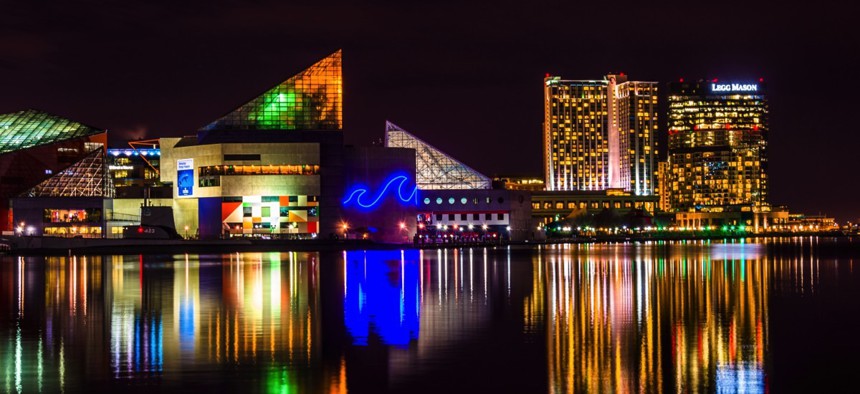Baltimore Unrest Prompts Note of Caution From Credit Analysts

Baltimore's Inner Harbor Jon Bilous / Shutterstock.com
Moody’s: There is a ‘potential for out-migration to increase, which could have a longer-term effect on the city’s tax base.’
It’s unlikely the recent unrest that has unfolded on the streets of Baltimore will dramatically upset the city’s creditworthiness, at least in the near term, according to a top credit rating agency.
But in comments issued late last week, Moody’s Investors Service also included a note of caution. “If the economic disruptions caused by this week's events linger well into the future, the city could experience a longer-term decline in property values and tax revenue with negative credit implications,” analysts for the rating agency wrote.
The analysts highlighted population declines the city has experienced in recent decades and said that “post-unrest, there is a potential for out-migration to increase, which could have a longer-term effect on the city’s tax base, wealth levels, and ultimately revenues.”
On the upside, Baltimore’s most recently released audit figures, for fiscal 2013, show that the city had a healthy amount of financial reserves on hand, according to Moody’s. These funds give the city a financial buffer to cover unexpected expenses, such as any police and fire department overtime.
The last audit found that the city had $299 million in reserves. This amount is roughly 18 percent of Baltimore’s general fund revenues, and the equivalent of 66 days of average operating costs for the city, Moody’s said.
As for Baltimore’s biggest revenue streams—property taxes and income taxes—it’s also unlikely they’ll see any immediate downtick, in the view of the Moody’s analysts. They said that any declines that do occur would likely happen over the course of several years.
The analysts did point to a handful of sensitive revenues that could take a near term hit, but said the consequences would not be severe. “While these revenues might drop due to the unrest, together they comprise less than 7% of the city's budget,” they wrote.
Money flowing from hotel taxes and video lottery terminals at the Horseshoe Casino, which is located in the city, were two of the sensitive revenue sources the analysts identified.
Episodes of violence, looting and arson occurred early last week in Baltimore. They took place in the wake of protests over the death of Freddie Gray, a 25-year-old man who died from a spinal cord injury in mid-April after city police took him into custody.
On Friday, Baltimore’s chief prosecutor filed criminal charges connected to Gray’s death against six city police officers.
NEXT STORY: Cleveland’s ‘Jock Tax’ Faces Big Setback in Court






